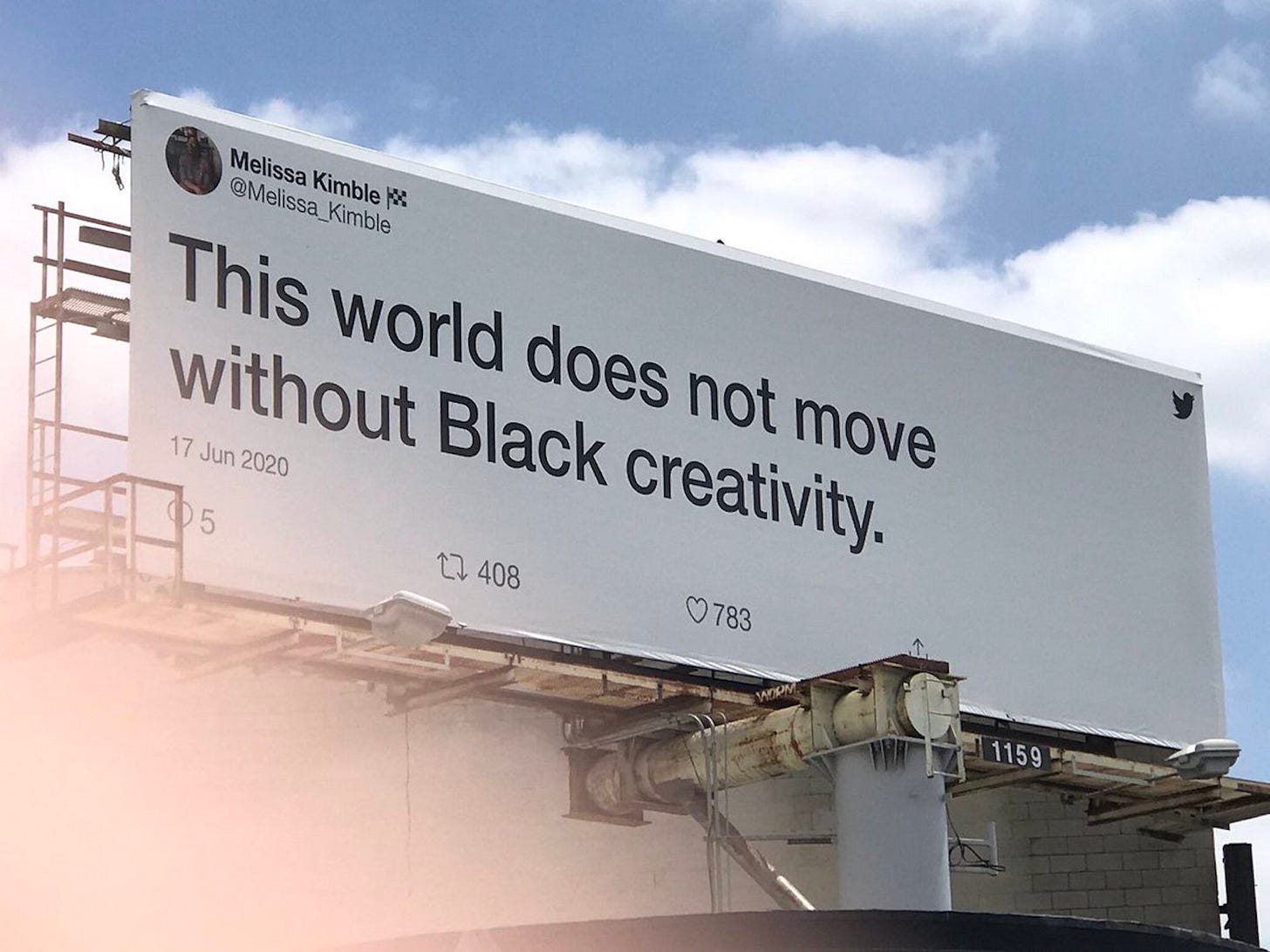not like us: the case for paying black creatives
on investing in the creativity you consume + reads & vibes for your weekend.
Welcome back to The Update!
Thank you for joining me. As usual, I appreciate your support. Let’s jump into this week’s conversation!
Let's be real, Black creativity is like the soundtrack of our lives. It's the beat bumping from our phones, the threads turning heads on the street, the stories that stay with us long after the credits roll. Black creators are the masterminds behind so much of what we love about culture, and that's most true here in America, where our cultural influence goes global. Did you see all that buzz about Kendrick Lamar's "The Pop Out: Ken and Friends" concert streamed worldwide via Prime Video and Twitch this Juneteenth? That's Black brilliance in action!
As I read the credits for the show, I found that it was led by a group of brilliant Black and Brown creatives - and letting them have the creative freedom to do that has translated to a big success (high social impressions + conversations) for Amazon. Everyone wins, right?
The Pop Out was a masterclass in how to effectively partner with Black creatives to create a cultural moment. But here's the issue - it was an exception, not the standard. More often than not, when it's time to cash the check, things get messy. Black creatives are often treated like human jukeboxes – our talent gets squeezed out and repackaged in a way that feels, well, a little less Black and maybe more "marketable" to those in charge.
Studies show Black creators consistently get paid less than their white counterparts, even for the same work. That supposed "lack of marketability" translates to Black creators getting passed over for big breaks, our concerns dismissed with lines like "pay your dues" or "that's just the industry." But, isn't that just a fancy way of saying the system is rigged? That it was designed to keep us out? This cycle of exploitation, disguised as tradition, needs to stop.
The problem goes deeper than just paychecks, though. When Black creatives are shut out of decision-making rooms, the culture they inspire gets used, not understood. Imagine a party where the music is all remixed without consulting the DJ, the decorations are a mishmash of what someone thinks is cool, and the food is bland because they didn't ask anyone who actually likes it what they want. That's what happens when Black voices are missing at the table. The result? Products that feel disingenuous, audiences who feel alienated, and a missed opportunity to build real connections.
Corporations know Black people have tremendous buying power, but they haven't invested in cultivating a real relationship with this audience. It's a shortcut that might seem easy in the short term, but it's a recipe for failure in the long run.

We gotta be honest: Black creativity is the heart of the party, not just the decorations. It's time to break down these barriers and make sure Black creators are valued not just for their work, but for their vision and their rightful place leading the cultural charge. This is why I’m such an advocate for Black owned media,
Let's give credit where credit is due, and make sure Black brilliance gets paid its dues – and gets a seat at the table!
NBC: Supreme Court Upholds Domestic Violence Gun Restriction
WaPo: Rift grows between Netanyahu and Israeli military over Hamas elimination
CNN: New York governor signs bill regulating social media algorithms, in a US first
While The Pop Out was significant in many ways, it was also complicated, to say the least.
This Teen Vogue piece explores how Dr. Dre’s appearance at the event was painfully ironic in light of his history with domestic violence. [Read here.]
Nylon Magazine profiled Chloe Bailey - who seems to cause a stir on the internet with whichever moves she chooses to make. They discuss this, and her upcoming album “Trouble In Paradise” which will feature a song with her sister, Halle. [Read here.]
Chloe’s mentor, Beyonce, gave a very rare interview (really a statement) to The Hollywood Reporter to talk about the success of Cowboy Carter and the impact it’s having on young Black artists in the genre.
“When you are breaking down barriers, not everyone is ready and open for a shift. But when I see Shaboozey tearing the charts up and all the beautiful female country singers flying to new heights, inspiring the world, that is exactly what motivates me,” Beyoncé tells The Hollywood Reporter in a statement.
Here’s your new music rundown:
Maeta & Kaytranada teamed up for a new EP called Endless Night. If you like dance vibes, this is for you. Stream: Spotify | Apple
Kehlani returns to give us the vibes we love on her latest album Crash. Thus far, I’m really enjoying “What I Want” and “Sucio” which features Jill Scott and Young Miko. Stream: Spotify | Apple
New on The Update Weekly Playlist:
Ariana Grande dropped the remix to “the boy is mine” featuring Brandi & Monica and if you are fans of the latter two, you’ll really love it it. Runs for days!
GloRilla finally let go of the ladies’ anthem of the summer, TGIF. It’s perfect for the pregame, or happy hour on your Friday evening.
Stream the playlist here: Spotify | Apple
Enjoy your weekend, and as usual - if you like what you read here, please feel free to share it with those closest to you.










